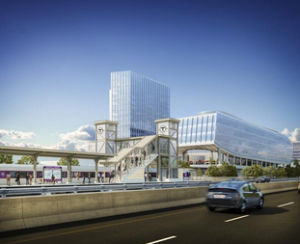This spring marked the commencement of construction for the new Boston Landing commuter rail station, part of the Allston-Brighton commuter line.
The new station will be located adjacent to the Massachusetts Turnpike as part of commuter line that connects Framingham and Worcester to South Station. It is expected to open in fall 2016, two years later than the original projected completion date.
 The station is estimated to cost approximately $20 million ($4 – $6 million more than the original projected cost) and is being financed by New Boston Landing LLC, a New Balance development company. It will provide service to employees of the well-known shoe company, and direct access to the company’s planned Boston Landing development, a complex of restaurants, shops, a hotel, and athletic facilities. The headquarters are still under construction.
The station is estimated to cost approximately $20 million ($4 – $6 million more than the original projected cost) and is being financed by New Boston Landing LLC, a New Balance development company. It will provide service to employees of the well-known shoe company, and direct access to the company’s planned Boston Landing development, a complex of restaurants, shops, a hotel, and athletic facilities. The headquarters are still under construction.
A select panel put together by Gov. Charlie Baker earlier this year to study the state of the MBTA suggested that the agency should put expansion plans on hold. However, the panel also stated that projects like this one—which leverage private or federal money—should be exempt from any moratorium and should serve as an example of the type of construction the MBTA should pursue “to stretch every dollar.”
But the protracted timeline also illustrates some of the potential difficulties of a public-private partnership. When private companies foot the bill for major infrastructure projects, the state may find itself beholden to their timeline. With a project like Boston landing, where a private company is ultimately paying the bill, it can be difficult to negotiate penalties for delayed construction.
“Even if it was behind schedule, there aren’t any financial penalties because the private entity has agreed to foot that bill,” said MassDOT spokesman Mike Verseckes.
It is an issue that the state could potentially encounter more frequently in the future, as the state considers other opportunities for public-private partnerships. Last year, the Transportation Department launched a commission to help bring in more private sector partnerships, such a bridge in Cape Cod where the developer could potentially charge tolls and collect revenue.
If the state plans to embark on further public-private partnerships that relate to higher-stakes infrastructure projects—affecting highways, bridges or rails already used by commuters—it would be necessary for officials to take a closer look at ways to negotiate financial penalties for delays.




